 |
- OTHER SERVICES VOICES:
- MARINES
- •
- NAVY
- •
- AIR FORCE
- •
- ARMY
- •
- COAST GUARD
|
An up close and personal interview with Army Veteran and Army.Togetherweserved.com Member:
CSM James Armour (Ret) (US Army 1966-1992)
WHAT PERSUADED YOU TO JOIN THE ARMY?
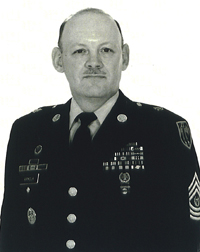 I grew up in a small town in southern Illinois where I did the normal things of any young person during that era. After high school I went to college on an academic scholarship, but unfortunately shortly after attending school I was involved in a terrible car accident. I tried attending school thereafter but it just didn't work out for me. I got a job, had a girlfriend, but was not happy with how my life was turning out. The Vietnam War had begun and I felt a patriotic duty to enlist. One day I went to our local post office where I saw a life-size poster of a Military Policeman. It was then that I decided to try to enlist as an MP. I qualified for induction with a contract to go to MP school, the rest is history. Never in my wildest dreams did I think I would serve for over 26 years in the Army. I grew up in a small town in southern Illinois where I did the normal things of any young person during that era. After high school I went to college on an academic scholarship, but unfortunately shortly after attending school I was involved in a terrible car accident. I tried attending school thereafter but it just didn't work out for me. I got a job, had a girlfriend, but was not happy with how my life was turning out. The Vietnam War had begun and I felt a patriotic duty to enlist. One day I went to our local post office where I saw a life-size poster of a Military Policeman. It was then that I decided to try to enlist as an MP. I qualified for induction with a contract to go to MP school, the rest is history. Never in my wildest dreams did I think I would serve for over 26 years in the Army.
BRIEFLY, WHAT WAS YOUR CAREER PATH IN THE SERVICE?
I became a Military Policeman, and my first assignment was in Kaiserslautern, Germany, K-town as it was called, which 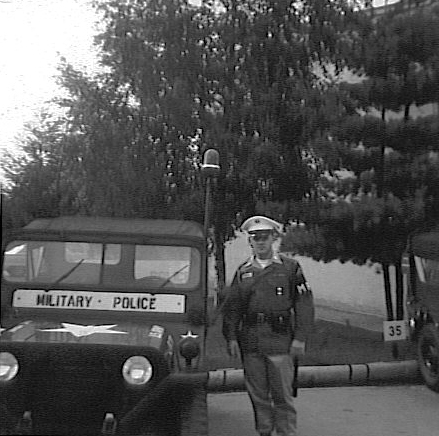 was also considered "Sin City" back then. We had the largest concentration of US Forces in that area which resulted in lots of action for an MP. It was here that I learned my MP skills. It was also here that I met the woman who would be my life-long companion. I thought my path would continue in the police operations aspect of the Military Police Corps but that would change after I was selected to become a Drill Sergeant. After this experience, the rest of my career was secured in being a "leader of soldiers." That was my niche, and I truly enjoyed mentoring and teaching young men and women in the art of soldiering. I also enjoyed the fact that for over 10 years of my career I represented the enlisted soldiers in whatever unit I was in. I received great satisfaction in knowing that what I did had an impact on so many soldiers. Despite the hardships at hand, and the fact that I had a heart attack at the young age of 42, I continued to persevere as a senior Non-Commission Officer. was also considered "Sin City" back then. We had the largest concentration of US Forces in that area which resulted in lots of action for an MP. It was here that I learned my MP skills. It was also here that I met the woman who would be my life-long companion. I thought my path would continue in the police operations aspect of the Military Police Corps but that would change after I was selected to become a Drill Sergeant. After this experience, the rest of my career was secured in being a "leader of soldiers." That was my niche, and I truly enjoyed mentoring and teaching young men and women in the art of soldiering. I also enjoyed the fact that for over 10 years of my career I represented the enlisted soldiers in whatever unit I was in. I received great satisfaction in knowing that what I did had an impact on so many soldiers. Despite the hardships at hand, and the fact that I had a heart attack at the young age of 42, I continued to persevere as a senior Non-Commission Officer.
DID YOU PARTICIPATE IN COMBAT OPERATIONS?
I missed going to Nam by one week after AIT. However, my time would come in 1970 when I got orders for Vietnam. I was a Sergeant then, but I don't think I was fully prepared to go to a combat zone at that time. I concentrated on knowing as much as I could about weapons, first-aid and physical fitness. I believed that all of these would help me to survive the experience that I was about to receive. Fortunately for me, I was assigned to Qui Nhon, working for my former First Sergeant. We ran the Military Police station in Qui Nhon where I became an expert in evidence procedures and physical security. I was often sent to places to check security and/or upgrade the local MP station's evidence procedures. I often assisted with the MP operational aspect of local law enforcement and at one time I was the Operations Sergeant over all the MP operations in Qui Nhon and our subordinate MP stations in Phu Tai, LZ English, and Phu Cat. I did this as a Sergeant E-5, performing duties of a Sergeant First Class E-7 position. I received a "blood stripe" promotion to Staff Sergeant E-6 shortly before my departure back to the states. That deployment represented lots of work, under trying circumstances, with tons of responsibility but I got it quick, learned fast, and survived the attacks.
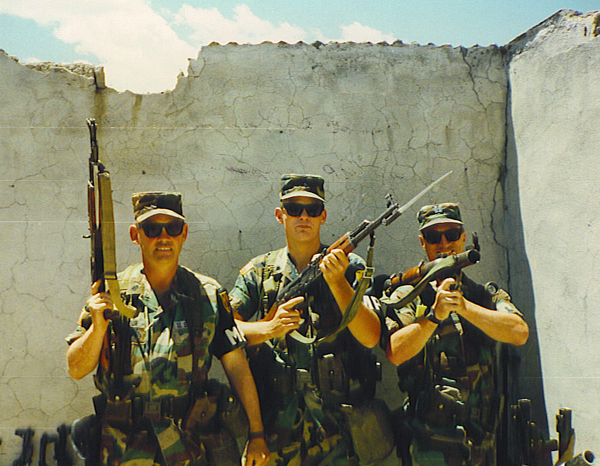 In Dec 88, our combat MP Battalion deployed to Panama, which was then considered a "hostile fire zone." Our mission was to provide security for the American dependents there and to assist in the security of US Forces personnel on the ground. During our tour we nearly went to war with Popular Defense Forces of the Noriega led regime on two occasions. After 4 months of near misses, we were relieved by the 720th MP Bn from Ft.Hood. Personally, it had been just 6 months since I underwent open heart surgery where I received a triple by-pass. Most thought I was crazy to deploy, but I felt it necessary to be with my soldiers. I trained them, now I was going to lead them. In Dec 88, our combat MP Battalion deployed to Panama, which was then considered a "hostile fire zone." Our mission was to provide security for the American dependents there and to assist in the security of US Forces personnel on the ground. During our tour we nearly went to war with Popular Defense Forces of the Noriega led regime on two occasions. After 4 months of near misses, we were relieved by the 720th MP Bn from Ft.Hood. Personally, it had been just 6 months since I underwent open heart surgery where I received a triple by-pass. Most thought I was crazy to deploy, but I felt it necessary to be with my soldiers. I trained them, now I was going to lead them.
In April 1991 we deployed MP forces to Northern Iraq to provide security in the Northern Fly Zone in support of Operation Provide Comfort. We set up operations in the deserted city of Zahko, Iraq. From here we provided security for the city and outlying roadways. Over time we assisted in the settlement of Iraqi refugees in safe havens near Zahko. Once gaining the trust of the Kurds in that area, we convinced them to return to their cities. As the senior enlisted MP in the Northern Zone I worked very hard to ensure the safety and security of my personnel. Additionally, I performed the duties as the Headquarters Commandant, attending to the needs of my soldiers. It was a difficult job, with lots of challenges, but ingenuity and perseverance won the day.
During Desert Shield/Storm, our unit provided major security efforts for US Army, Europe to counter possible terrorist attacks. It was then that US Army Infantry forces were sent to Germany to support our security efforts. This was the first time that Infantry forces were under the operational control of a Military Police Brigade since "Tet 68" in Vietnam.
FROM YOUR ENTIRE SERVICE CAREER WHAT PARTICULAR MEMORY STANDS OUT?
The most significant event in my career was my heart attack. At age 42, I was a Battalion level CSM who, up to this point, had made significant sacrifices throughout my career to the Army. The pressures of serving as a Drill Sergeant, 4 year First Sergeant assignments, and then as a CSM took its toll on me. I was a "Category A" personality who tried to excel at everything. It appears that my exposure to Agent Orange in Vietnam affected my cardiac posture, resulting in a heart attack. The pressures of the day were contributing factors for me at such an early age. My performance during the deployment to Panama was a turning point. The Medical Evaluation Board decided that if I could deploy then I should be retained on active duty.
WHICH INDIVIDUAL PERSON FROM YOUR SERVICE STANDS OUT AS THE ONE WHO HAD THE BIGGEST IMPACT ON YOU...AND WHY?
The one person that stood out for me was my Battalion Commander during my time as a Drill Sergeant. He was the one who took time to sit down with me and explain the importance of planning. We did this on numerous occasions and continued to converse after being stationed together. I think he perhaps saw something in me and he took time to develop me along the way. I copied his approach and did the same thing with other soldiers under my charge. Colonel Jack M. Mays was a remarkable leader and soldier. What Col Mays taught me came again and again in my mind throughout the difficult years as a 1SG and CSM.
WHAT PROFESSION DID YOU FOLLOW AFTER THE SERVICE AND WHAT ARE YOU DOING NOW?
After the military I went to work in the education arena, helping kids learn more about themselves. I became a JROTC Instructor, which gave me an outlet to influence young people to become better Americans. I received great satisfaction knowing that I was able to help a young person find him or herself. I went back to college and obtained a degree. It was here that I again had the opportunity to influence others. Often the oldest person in my classes, I was called upon to interject my thoughts and ideas on a number of topics. On the morning of 9/11, I was asked by every professor, in every class, what I thought about the situation. I told them all the same thing; "believe in your Armed Forces, and when you go home, tell someone you love them." My last semester was plagued by medical issues and 2 weeks after graduation I underwent major back surgery. To this day, I cannot accept full-time employment due to medical issues. However, I have been featured on national television on the History channel's program, "Military Police, Warriors behind the Badge," and have been sought out by authors and historians for my input on a variety of military history items of interest. Most recently, I was the keynote speaker at the 68th Military Police Anniversary Ball in Heidelberg, Germany.
HOW HAS SERVING THE ARMED FORCES INFLUENCED THE WAY YOU HAVE APPROACHED YOUR LIFE AND CAREER?
Military service has provided me with the ability to concern myself with others and be there when needed. That is pretty much what I did in the service; I worked with people to make them better. Everyone who knows me realizes this, and that I can be counted on in time of need.
HOW HAS TOGETHERWESERVED.COM HELPED YOU TO MAINTAIN A BOND WITH THE SERVICE AND THOSE WITH YOU SERVED WITH?
Togetherweserved.com has given me the opportunity to connect with many of those I served. It also has given me the chance to connect with many soldiers that would otherwise be unknown to me, to provide praise for what they have done and guidance when asked. Connecting with young soldiers is awesome. I think it is important that retirees continue to be an active part of our men and women in uniform. Because we too have been there, they usually take heed of what we have to say.
|
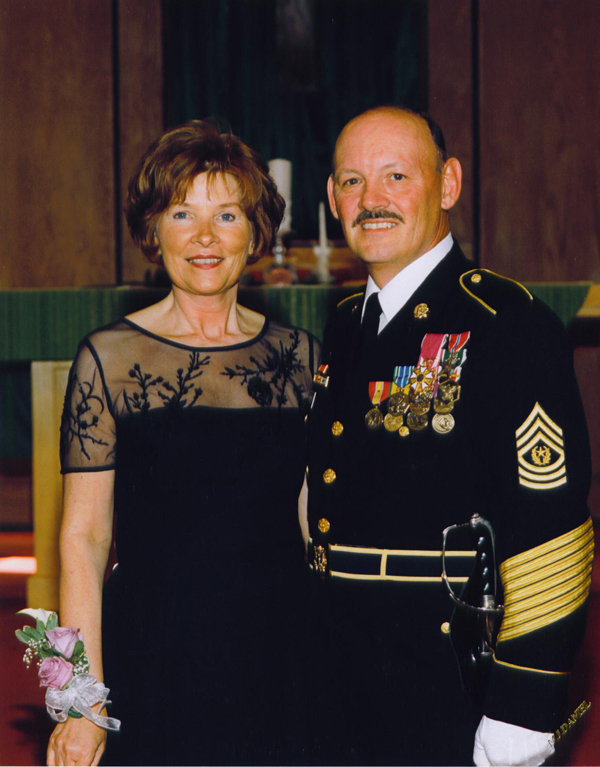
CSM James Armour
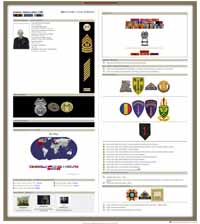
View CSM James Armour's Shadowbox on TWS
|
|
Share this Voices Edition on:



 |
|
TWS VOICES
TWS Voices are the personal stories of men and women who served in the US Military and convey how serving their Country has made a positive impact on their lives. If you would like to participate in a future edition of Voices, or know someone who might be interested, please contact Major Wesley Prater HERE.
This edition of Army Voices was supported by:
Army.Togetherweserved.com
For current and former serving Members of the US Army, US Army Reserve and US Army National Guard, TogetherWeServed.com is a unique, feature rich resource helping Soldiers re-connect with lost Brothers, share memories and tell their Army story.
To join Army.Togetherweserved.com, please click HERE.
|
|